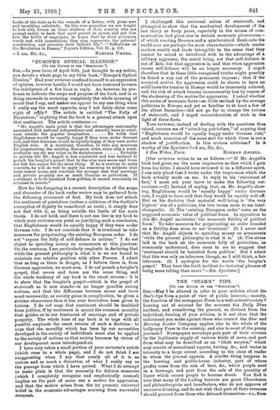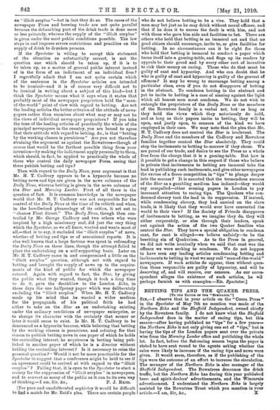THE " STAR'S " TIPS.
tro TYR EDITOR Or TIM " SPROTATOL.1 SIB, —May I be allowed to refer to your articles about the Star's tips from a point of view of public interest,—namely, the function of the newspaper Press in a well-ordered society P Leaving out of account for the moment the Daily News incident, and considering the general, as distinct from the individual, bearing of your articles, is it not clear that the indictment you make against those who control the Star and Morning Leader Company applies also to the whole of the halfpenny Press in the country, and also to most of the penny journals P Newspapers nowadays gain part of their revenue by the legitimate supply of various kinds of news, and part from what may be described as an "illicit surplus," which may consist of sensational reports, betting, &c., and varies in intensity to a large extent according to the class of reader to whom the journal appeals. A similar thing happens in the brewing and public-house industry, part of whose profits come from the sale of beer, &c., which people need as a beverage, and part from the sale of the quantity of liquor which causes people to become drunk. You find it true that many of the leading brewers are great Churchmen and philanthropists and benefactors, who do not approve of excessive drinking, and do not wish that part of their revenues should proceed from those who debauch themselves—i.e., from
an "illicit surplus "—but in fact they do so. The cases of the newspaper Press and brewing trade are not quite parallel because the debauching part of the drink trade is done more or less privately, whereas the supply of the "illicit surplus" is given under the most public conditions possible. The law steps in and imposes severe restrictions and penalties on the supply of drink to drunken persons.
If the Spectator is willing to accept this statement of the situation as substantially correct, is not the question one which should be taken up, if it is to be taken up, as a matter of general public interest instead of in the form of an indictment of an individual firm ? I regretfully admit that I am not quite certain which of the sentences in the Spectator articles are intended to be ironical—and it is of course very difficult not to be ironical in writing about a subject of this kind—but I think the Spectator means what it says when it states that probably most of the newspaper proprietors hold the "man- of-the-world " point of view with regard to betting. Are not the leading articles the better criterion of the attitude of news- papers rather than surmises about what may or may not be the views of individual newspaper proprietors ? If you take the tone of the leading articles of practically the whole of the principal newspapers in the country, you are bound to agree that their attitude with regard to betting, &c., is that " betting by the working classes is pernicious." Are you not therefore straining the argument as against the Rowntreea—though of course that would be the farthest possible thing from your intention—by making the indictment apply personally to them, which should, in fact, be applied to practically the whole of those who control the daily newspaper Press, seeing that these publish betting and tips ?
Then with regard to the Daily News, your argument is that Mr. H. T. Cadbury appears to be a hypocrite because no betting news and tips are given in the news columns of the Daily News, whereas betting is given in the news columns of the Star and Moriiing Leader. First of all there is the question of fact. It is common knowledge in the newspaper world that Mr. H. T. Cadbury was not responsible for the control of the Daily News at the time of its rebirth and when, in the bowdlerised phraseology of its critics, it set out to "cleanse Fleet Street." The Daily News, though then con- trolled by Mr. George Cadbury and two others who were inspired by a high missionary zeal, did just the very thing which the Spectator, as we all know, wanted and wants most of all,—that is to say, it excluded the " illicit surplus " of news, whether of betting and tips or of sensational reports. It is also well known that a large fortune was spent in refounding the Daily News on these lines, though the attempt failed to place the undertaking on a self-supporting basis. Later on Mr. H. T. Cadbury came in and compromised a little on the " illicit surplus " question, although not with regard to betting, and brought the supply of news up to the require- ments of the kind of public for which the newspaper catered. Again with regard to fact, the Star, by giving the public what they wanted, though it took a long time to do it, gave the deathblow to the London Echo, in those days the one halfpenny paper which was deliberately excluding the "illicit surplus." When Mr. H. T. Cadbury made up his mind that he wanted a wider medium for the propaganda of his political faith he had either to take on the Star as an undertaking existing under the ordinary conditions of newspaper enterprise, or to change its character with the certainty that sooner or later it would cease to exist. Is Mr. H. T. Cadbury to be denounced as a hypocrite because, while believing that betting by the working classes is pernicious, and refusing for that reason to publish betting news in one paper of which he holds the controlling interest, he acquiesces in betting being pub- lished in another paper of which he is a director without holding the controlling interest ? Is it necessary to raise the personal question ? s Would it not be more practicable for the Spectator to suggest that a conference might be held to see if an agreement could be arrived at with regard to the " illicit surplus " ? Failing that, it is open to the Spectator to start a society for the suppression of "illicit surplus" in newspapers, and to convert as many of the public as it can to its own way [For pure and unadulterated sophistry it would be difficult to find a match for Mr. Reid's plea. There are certain people who do not believe betting to be a vice. They hold that a man may bet just as he may drink without moral offence, and that if he does it to excess the fault is with him, and not with those who gave him aids and facilities to bet. There are others who hold that betting is an immoral act and that no good citizen should encourage, incite to, or give facilities for betting. In no circumstances can it be right for those who hold that betting is immoral to conduct a paper which turns itself into a gaming-table, and flogs up its readers by appeals to their greed and by every other sort of incentive to risk their money on racing. Those who do that must be guilty of cant and hypocrisy. And who can doubt that he who is guilty of cant and hypocrisy is guilty of the gravest of offences? It may be wrong to encourage betting among a particular class, even if you do not disapprove of betting in the abstract. To condemn betting in the abstract and yet to incite to betting is a case of sinning against the light which all honest men most condemn. We do not wish to entangle the proprietors of the Daily News or the members of the Rowntree family in a verbal net, but • as long as they hold the views which they notoriously do hold, and as long as their papers incite to betting, they will be open, and justly open, to censure of the kind we have employed in their case. We may note that the plea that Mr. H. T. Cadbury does not control the Star is irrelevant. The Daily News and the members of the Cadbury and Rowntree families together control the Star absolutely. They could stop the incitements to betting to-morrow if they chose. We are proud of our trade, and desire to see the Press as a whole free from the charge that it is a gaming-table. But bow is it possible to get a change in this respect if those who believe in private that incitements to betting are immoral take the lead in publishing such incitements, and give other newspapers the excuse of a fierce competition in " tips " to plunge deeper into the morass ? It is asserted that the tremendous success of the Star as a gambling medium has induced—they would say compelled—other evening papers in London to pay increased attention to racing tips. The Quakers who con- demned slavery took the lead in its suppression. If instead, while condemning slavery, they had carried on the slave trade, is it likely that they would ever have converted the world to their view ? If the Society of Friends disapprove of incitements to betting, as we imagine they do, they will either corporately, or else through their leaders, speak out against the action of the two Quaker families who control the Star. They have a special obligation to condemn cant, for cant is alleged—we believe unfairly—to be the besetting sin of Quakerism. As to the Press in general, we did not write ironically when we said that cant was the offence we were seeking to condemn. We do not happen to have seen any leading articles condemning betting and incitements to betting in what we may call "man-of-the-world." newspapers. If such articles do appear, then without ques- tion those responsible are guilty of hypocrisy, and will be deserving of, and will receive, our censure. As our corre- spondent alleges the existence of such articles, he wil perhaps furnish no with examples.—En. Spectator.]







































 Previous page
Previous page